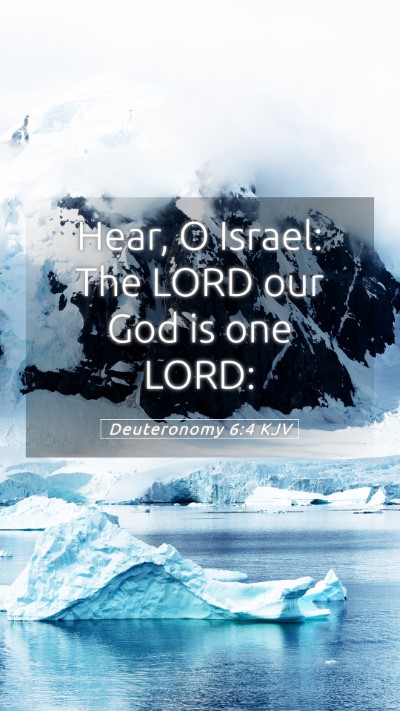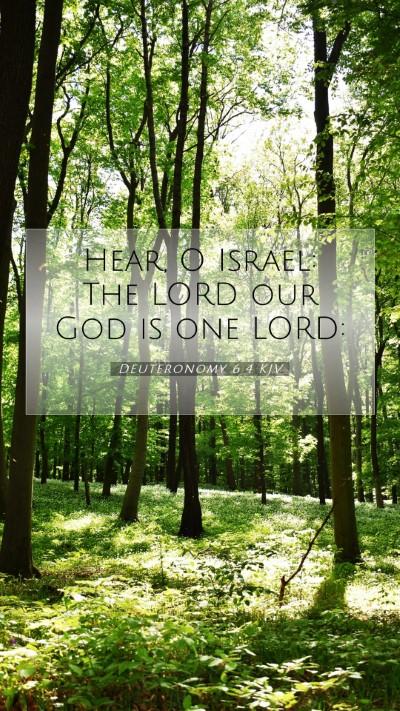Understanding Deuteronomy 6:4
"Hear, O Israel: The LORD our God is one LORD:"
The verse Deuteronomy 6:4, often referred to as the Shema, is one of the most fundamental passages in the Bible, emphasizing the unity and singularity of God. It serves as a foundation for Jewish monotheism and is central to Christian theology as well.
1. Biblical Context
The context of this verse is the covenant relationship between God and His people, Israel. It is called the Shema, derived from the Hebrew word for "Hear." This call to listen is imperative, as it demands attention and response.
2. Significance of "The LORD" (YHWH)
Matthew Henry highlights that the designation of God as "LORD" (YHWH) reflects a relationship of both authority and existence. It is not just a title, but a declaration of God’s continual presence and covenant faithfulness.
3. The Concept of Oneness
Albert Barnes describes the significance of the term "one" in this verse. It affirms the uniqueness of God, rejecting polytheism and asserting the indivisibility of God’s being. The Shema encompasses the essence of true worship, which recognizes God’s sovereignty.
4. The Call to Love God
This verse leads into the subsequent commandment to love God wholeheartedly (Deuteronomy 6:5). Adam Clarke emphasizes that the acknowledgment of God’s oneness necessitates a corresponding love and devotion from His people.
5. Application in Daily Life
Understanding Deuteronomy 6:4 prompts believers to examine their relationship with God both in personal faith and community worship. Engaging with this verse in Bible study groups can inspire discussions about monotheism and devotion.
6. Historical Context
Historically, the proclamation of God's oneness was vital for Israel as they encountered surrounding nations promoting polytheistic beliefs. Biblical exegesis reveals how this verse fortified Israel's identity and mission amidst cultural pressures.
7. Comparing with New Testament Teachings
The New Testament reaffirms this teaching in Mark 12:29-30, where Jesus cites the Shema as the greatest commandment. Thus, the implications of this verse transcend the Old Testament framework, establishing its significance in Christian doctrine.
8. Cross References
- Isaiah 45:5: "I am the LORD, and there is no other; apart from me there is no God." - reinforces the oneness of God.
- 1 Timothy 2:5: "For there is one God and one mediator between God and mankind, the man Christ Jesus." - affirms Christian monotheism.
- James 2:19: "You believe that there is one God. Good! Even the demons believe that—and shudder." - highlights the recognition of God's oneness.
9. Conclusion
This verse not only serves as a foundational statement of faith but also challenges believers to engage in Bible study insights that illuminate their understanding of divine oneness. This process of Bible verse interpretation invites individuals to explore the depths of their faith and the practical applications in their lives.
10. Further Study
For those seeking deeper understanding, consider utilizing various Bible study tools and Bible study resources to explore the meanings behind verses like Deuteronomy 6:4. It’s beneficial for Bible study lessons and can be a focal point in online Bible study formats.


